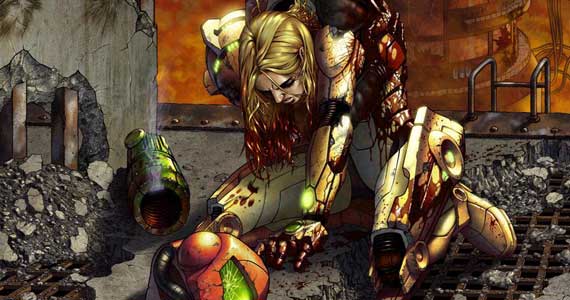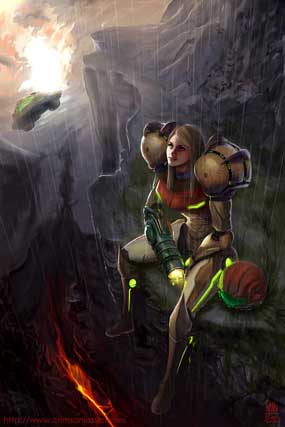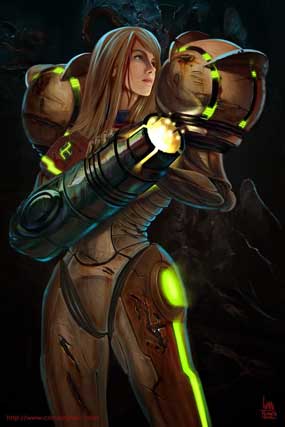
I wouldn’t have thought that a post about a teaser site would get me so fired up, but Nick Rumas’ 4cr post about Other M had the ability to stop me dead in the water, and not because he is more optimistic about changes to the Metroid series – if we all thought the same life would be far too bland to go on living.
Rather it was this particular comment attached to the post that stuck me like a needle –
It reminds me of the Metroid Manga, which was fairly good, This game is conveying emotion, which is a great thing I feel, for this game will bring the series to new places, by mixing a great story in with great action. They are just trying to give this series depth, rather than a regular old sci-fi shooter. when you think about it, your still going to be shooting giant space pirates and collecting new upgrades, but this time around I’ll feel the anger and pain of loss, suffering that they’ve caused, and really get enjoyment from killing space pirates and whatnot
Now it’ll seem like I’m singling this comment out to simply pick on it, but I believe it’s an incredibly important talking point that needs some examination. Neither is it my intention to tell you how you should feel about potential changes to the Metroid series via a game we know very little about.
Rather, the inference of where depth emerges from in this comment touches directly on whether the medium of gaming is one we as gamers actively engage with, because without that level of active engagement we’re merely pressing buttons to watch longer movies.

Rumas’ referencing of melodrama is probably an ideal place to start, because just from the teaser site alone, there’s an enforcement of the idea that has long bothered me – that this game will from the outset work to force specific feelings onto the player. That is to say, it smells already of an emotional agenda that means to tell the player how they should feel by spoon feeding them with character profiling sequences and events that leave little to the imagination, which we do have, even if we’ve gotten rusty at using it.
Then again, it may do none of this, we just don’t know yet.

My experience as a gamer has been a fairly long journey, starting at the earliest roots of the industry. I logged countless hours into games that possessed no semblance of story structure whatsoever – sometimes I’d make up my own.
I also invested my life into the first RPGs, where blocky lumps of pixels seemed as real to me as anyone I might meet the next day. And I watched it all evolve, with characters pushing with each new cycle of hardware to blur the line between reality and the screen.
There was definitely a time when games were sold to me on structured and linear stories, largely delivered via cutscenes and cinematics that offered a very filmic sense of emotional transference to the audience.
You were given the sense of how the characters felt, and had feelings of your own in response, which could often feel separated from the feelings that emerged from the direct interaction of the actual playing – of pressing buttons to cause reactions we could feel prior to the age of force-feedback controllers.
It was a long time before I began appreciating the difference the gaming medium offers for a more direct approach, a more direct line toward making us feel from the spectrum of available emotions – not specific feelings mind you, there is no one feeling we can all derive from any game.
This has nothing to do with story development, but plenty to do with story delivery. I could cite some character interactions from Half-Life 2, but we’re probably all getting sick of falling back on that title. Besides, there’s much more to gain from asking if Shadow of the Colossus would have been even greater had it not been so ambiguous – an idea you won’t hear anyone express for the simple reason that they’d be clubbed to death on the street for doing so.
So why is Metroid any different?
The most important element of Metroid is the openness it offers for multiple feelings and interpretations. I’ve written about that with some energy at least once, simply to show how much room for interpretation the series has. And yet Metroid still has story progression, it doesn’t ask us to just sit in a dark room for twenty hours.
There’s progression to direct the action, but the series never attempts to tell you how you should feel. It’s the ideal of classic Nintendo games, which deliver feelings through the act of playing them rather than the direct control of a narrative push. But Metroid goes further than the rest perhaps because of its science fiction pedigree.
In many ways Metroid feels like the last thread connecting us to the world created by films such as Alien, Bladerunner, and most recently with the rare treat that was District 9 – a crumbling wall separating the last of the crazy people from a world where Avatar is successful.
This isn’t the difference between a play style, this isn’t the argument that changing the play will dampen the series as was the fear of some prior to Metroid Prime.
In the same way those films build richer worlds through various means beyond simply telling you what the reality is, Metroid also offers a deeper experience unique to the gaming medium, with the crafted and flowing connections between its world, its characters, and its mechanics, which we then journey through in ways unique to us. This is when the subtle cues of music can make a difference in connection to everything the player is experiencing in a given moment, which is far different from a simple cue for an emotional pitch as an added artificial layer – every bit a step backward for any game relying on such tactics.
The invitation so often offered by the Metroid Prime series for instance, is one of finding a game of your own – as deep or as shallow as you prefer.

IF Other M goes all melodrama anime on us, it will certainly be in the attempt to broaden the appeal of the series, exactly because of feelings like those expressed in the comment that started me writing this post.
There’s every reason to believe it will lose the substance of the series in an attempt to cater to perceived desires. Hearing Reggie say not to worry because he reads the blogs fills me with all the confidence of hearing that my parents asked around before buying me a game for Christmas.
There’s the faint scent of an agenda attempting to make the series more accessible to people who leave comments like the one I’ve referenced, offering a game more immediately and easily comprehensible – at the same time offering an easier direction for expanding the series. And that likely would make the game easier to pick up, easier to play through, and easier to forget about, catering to a segment of the gaming community that knows the price of everything and the value of nothing.

Am I crazy? Do we not currently see arguments where people suggest games should be priced by their visual prowess over all other concerns?
These would be the same people who fawn over the idea of an HD Zelda, illustrating a disease that has seemingly made the aesthetics of gaming more crucial than the context – that good ol’ substance if you would. And while the money to keep the industry moving forward might focus on the eye-candy that makes the medium more comprehensible to some, it’s not what will validate this medium in the long run.
That sounds a bit preachy given that I once wrote off the Wii as well because of titles that stressed graphical limitations, a propensity for inviting shovelware, and often tacked on motion controls.
All I can say is that playing titles like Silent Hill last year, and I hope titles like Fragile this year, continue to illustrate the console’s ability to change the emphasis of game design for the better, for those looking for a deeper level of engagement.
It would be a crushing shame to see one of the longest running examples of that ideal veer off course on that very same console.
